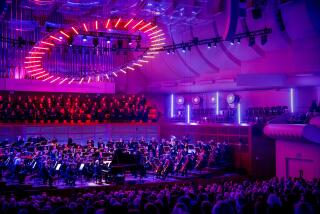Schoenberg Masterpiece by Ear Only
Anyone who attended the stunning production of Schoenberg’s uncompleted opera “Moses und Aron” in Amsterdam in the fall of 1995, or the same staging at last summer’s Salzburg Festival, must have come away with a new appreciation both for the music and for the theatricality inherent in the libretto, the composer’s own but barely tapped until stage director Peter Stein came to it with new, fearless eyes.
The music was in the hands of Pierre Boulez, who made Schoenberg’s terse phrases sing with a sort of keening, fractured lyricism, the existence of which a younger, more hard-nosed Boulez would have denied. In Amsterdam as in Salzburg, Holland’s Royal Concertgebouw Orchestra played this most taxing of scores, which it was encountering for the first time, as naturally as if it were a staple of its more common late-Romantic repertory.
On the just-released recording (Deutsche Grammophon 449 174, two CDs), certain musical effects are also powerful. For one, Boulez’s conducting additionally projects a degree of impressionistic detail that evaporated in the large houses. And the work of the augmented Netherlands Opera Chorus--personifying the Children of Israel--is ensemble virtuosity defined.
At home as in the theater, one feels the rock-like grandeur of David Pittman-Jennings in the speaking role (with the eerie, pitched speech that Schoenberg invented) of the aged, pessimistic Moses, unwavering servant of God, man of conscience.
On the other hand, Aron (the superstitious Schoenberg dropped one “A” in the spelling of the name to avoid a title with 13 letters) is a pragmatist and man of action. In live performance, tenor Chris Merritt’s Aron could partly compensate for strained vocalism with commanding stage presence, but on the recording all that emerges is what’s wrong with the singing. True, it’s a punishingly difficult, high-lying role, but that makes Merritt’s quavery, strangulated bawling no more tolerable. Schoenberg depicts Aron as rather glib, a main-chance man, a wheedler. But it’s tough to wheedle when you’re choking.
Some roles that had little effect onstage assert themselves strongly at home, like that of the old Priest, fervently sung by Laszlo Polgar. Then again, the Young Girl (the only name she’s given) was effective onstage in the alluring form of Gabriele Fontana. Experienced solely through the ears, you realize that she’s doing more yelping than singing.
That “Moses und Aron” is singable in all its vital parts is made manifest in a recently released studio recording (Berlin Classics 11162, two CDs) based on 1976 radio performances in Leipzig. Its conductor, the late Herbert Kegel, may not have Boulez’s transfiguring touch, but he too has dug deeply into the score to deliver a more traditionally tough, fast-paced interpretation, which is reminiscent of Boulez’s earlier Sony recording of the opera.
Kegel’s Leipzig Radio Orchestra and Chorus are hardly less accomplished than their DG counterparts, while the black-voiced Werner Haseleu is a Moses of downright frightening rectitude. Reiner Goldberg, then on the verge of a major Wagnerian career (it didn’t pan out), is Aron to the hilt, offering ringing power at one moment and insinuating lightness at another, rising heroically to the B flats that are Merritt’s final undoing.
In keeping with Boulez’s broad, multicolored view of the score, the DG recording, made in the Amsterdam Concertgebouw between scheduled performances, is at once spacious and finely detailed. Berlin Classics’ sonic production is likewise apt: sufficiently close up to reveal the complex weave of the score but not lacking depth.
Although I would have felt much the poorer for not having seen the Amsterdam-Salzburg production, experiencing it without benefit of visuals is a less rewarding proposition. The Leipzig Radio version, however--which I had not heard before receiving these CDs--comes not only as a surprise but is as close to a complete musical realization of Schoenberg’s harrowing, intractable masterpiece as we have any right to expect.
More to Read
The biggest entertainment stories
Get our big stories about Hollywood, film, television, music, arts, culture and more right in your inbox as soon as they publish.
You may occasionally receive promotional content from the Los Angeles Times.










